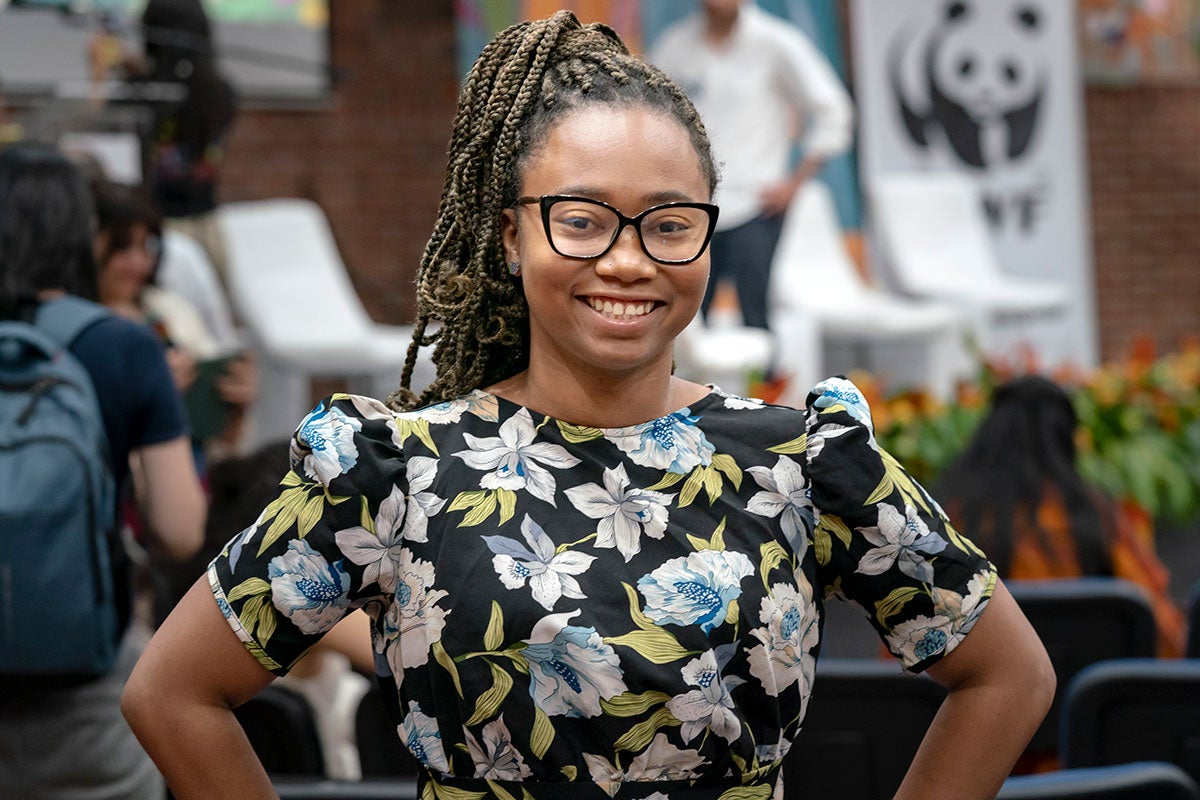For ALL Women and Girls: Sandra Patricia Aguilar Carabalí believes that women’s leadership is key to protecting Colombia’s environment and peace
Date:
#ForAllWomenandGirls is a rallying call for action on the 30th anniversary of the Beijing Declaration and Platform for Action. Sandra Patricia Aguilar Carabalí leads youth and women’s resistance in northern Cauca, Colombia, a region marked by violence and environmental challenges.

Women’s leadership in climate justice in Cauca
“Environmental sustainability is essential for lasting peace in Cauca, because the territory and its natural resources are the heart of our identity and survival,” says Sandra Patricia Aguilar Carabalí.
As president of the Cauca Department Youth Network (REDEJOCA), she trains and empowers women and youth to protect and restore the rivers that indigenous communities of northern Cauca, Colombia, depend on. The Quinamayó, Palo, and Desbaratado rivers flow into one of Colombia’s most important waterways, the Cauca River, a lifeline for millions of people. The rivers have suffered years of environmental degradation because of industrial waste, pollution, conflict, and lack of waste management.
“Today many homes do not have drinking water,” shares Aguilar Carabalí. Diseases have spread among the communities relying on these rivers.
The environmental crisis is compounded for women in her community, she adds, as they are the ones providing water, preparing food, and caring for their families: “Many women must travel longer distances in potentially dangerous conditions to collect water, which not only jeopardizes their safety but also robs them of time that they could have used for education, work, or rest.
Cauca is one of the most biodiverse departments in Colombia. The conflict between illegal groups has led to the plunder of natural resources, land grab, and relentless violence.
“Historically, women have played a fundamental role in peacebuilding, working within their communities to preserve the environment,” explains Aguilar Carabalí. “Through their traditional knowledge and leadership, they have cared for biodiversity, restored ecosystems, and created sustainable initiatives. Protecting the environment is not only an act of conservation for them, but also an act of resistance to the violence and inequality in the region.”
By protecting the environment, environmental defenders like Aguilar Carabalí and others build sustainable livelihoods for communities and reduce the risk of conflicts.
“Peace and the environment are intrinsically connected in Cauca, and working for both is essential to guarantee a more just and equitable future for our communities.”
Challenges faced by environmental defenders
“One of the biggest challenges we face is the lack of institutional support for women-led community initiatives,” says Aguilar Carabalí. “Another major challenge is the impact of extractive economic activities, such as illegal mining and monocultures, which not only destroy our ecosystems but also generate serious risks to the health and well-being of our communities, especially for women and girls.”
She also highlights the constant threats, violence and intimidation that women environmental defenders face. A recent Global Witness report shows that an estimated 196 land and environmental defenders were killed in 2023, and for the second year running, Colombia ranked as the most dangerous place for environmental defenders, with a record 79 killed.
Today, Aguilar Carabalí is part of UN Women’s groundbreaking programme, “Women Changing Their World”, funded by the Government of Germany and implemented in partnership with the Government of Colombia. The programme strengthens the voice, capacity and influence of women environmental defenders in Colombia in local environmental governance.
She dreams of “a Cauca where rivers are once again the heart of community life, and women and youth are the protagonists of a sustainable future.”
The Beijing Declaration and Platform for Action – a call for action and hope for young feminists
“The Beijing Declaration and Platform for Action are a constant call to action and hope,” says Aguilar Carabalí.
She was a student of law when she first learned about the Beijing Declaration and Platform for Action and realized how they had marked a turning point in the global movement for women’s rights. “The Beijing Platform for Action represents a roadmap that reminds us that gender equality is a collective struggle that crosses generations. As a young activist, it connects me to the legacy of women who have been trailblazers before me.”
The commitments made in the Beijing Declaration and Platform for Action, adopted by 189 governments in 1995, including Colombia, resonate with Aguilar Carabalí’s struggles today.
“The gender inequalities and social injustices they sought to address persist in many parts of the world – violence against women, gaps in education and employment, lack of political representation, and limited access to comprehensive health services are issues that still require urgent attention,” she says. “In the current context of climate and social crises, its vision of empowering women as change agents is more crucial than ever.”
“The Platform is not just a historical document. It is a living guide for transformative action,” she adds.
Aguilar Carabalí sees the confluence of technology, youth and gender equality movements as a powerful push forward.
“To fully achieve the vision of the Beijing Platform for Action, youth movements must continue to strengthen intergenerational alliances, demand the implementation of public policies based on the commitments made, and use their creativity to mobilize more people into collective action.”